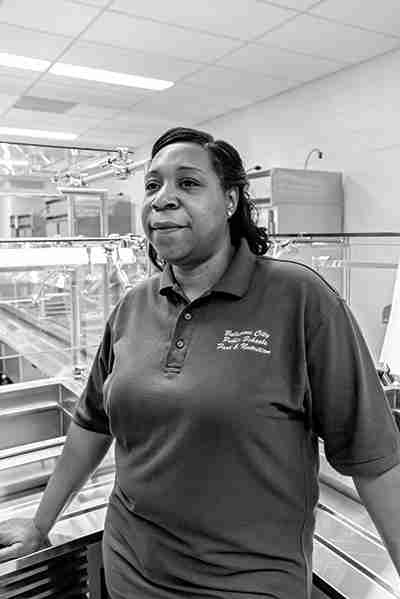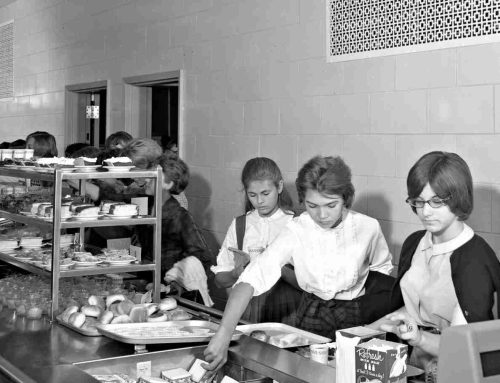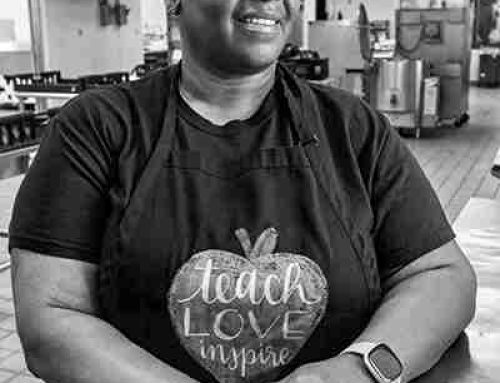Listen to the interview with Jami and Aaron Henkin from WYPR.
Name: Jami Washington
Job title: Cafeteria Manager II
Photograph location: photographed at Patterson High School
Years of service: 19
Most of our children are in poverty, low income neighborhoods, and pretty much food deserts. They don’t know a lot about fresh fruit and vegetables. Thanks to the food and nutrition department here in Baltimore City, they’re able to get that. This job will play on your heart, because you deal with so many different individuals, and what they’re going through. -Jami Washington
Jami Washington_Patterson HS_08-23-21
Transcript of Jami Washington’s interview with Aaron Henkin by Rev.com
Jami Washington:
Well, good morning. My name is Jami Washington. I am a cafeteria manager II, and I currently work at Patterson High School.
Aaron Henkin:
Talk to me about… Rewind to the beginning of your career. When did you start? How did you get into it?
Jami Washington:
Okay, so my career began back in 1999. I came at the age of 19, I’m fresh out of high school, and I begun to work as a 3.5 hour employee, which is a temporary position with no benefits. And I begun my career working at Walbrook Senior High School.
Aaron Henkin:
What do you remember about your first couple of days on the job? Like, what surprised you? What did you have to learn?
Jami Washington:
The biggest issue for me in the beginning was learning the serving sizes for certain items, what scoop to use, and they were color coordinated. So, that’s how I learned how to actually measure certain items by the colors of the coordination in the serving utensil.
Aaron Henkin:
Talk about how many years you’ve been on this career path, and the different positions that you’ve evolved through over the years.
Jami Washington:
Oh, okay. When I first started, I started out as a food service worker I, three and a half hours. Yes, three and a half hours. And then I became a six-hour employee, which later became a person in charge, which was still six hours. Hadn’t become a full manager yet, but at that time, we had pre-plate food. So, it was really no cooking, it was more like a heating serve type of situation. And then I became a manager I, and now manager II. This is over a 22 years span.
Aaron Henkin:
Tell me what an average day at work is like for someone in your position.
Jami Washington:
There is no such thing. Every day is different. Even though our jobs as managers are repetitive, but anything can happen within a day. Whether it be a crisis in the building, it could be a crisis with your staff, or just simply your milk order not coming on time. So, that changes the dynamics. We may have to call someone. You just, you don’t know. It’s a day-to-day type of job, so there’s really no set one thing. The only thing that’s certain is you must serve the kids.
Aaron Henkin:
Talk about the number of students you’re feeding, the amount of food that you need to prepare, and how you decide what folks are going to eat.
Jami Washington:
Okay. Like I said, I’ve been around for a while, so you kind of… One tool that we use is called a production record. Then, what a production records allow, it teaches you is what children like and don’t like.
Jami Washington:
So, if it’s a popular item like pizza, you know you have to prepare much more than you would, just say fiesta black beans. You just would not prepare the same amount, because you know they’re not going to take a lot of.
Jami Washington:
And then that helps with food costs, because you know there’s going to be a lot of waste. I would think the biggest thing would be, is just dealing with things head on every day. That’s my best advice, honestly, with this job and what I do.
Aaron Henkin:
Have you always liked food, and cooking?
Jami Washington:
Yes. From a very small child, I was a child that would be in a chair at the table, waiting for the kickball, or something for me to stare, or can I put some type of seasoning in with my grandmother or my mom? So, cooking has always been a passion for me.
Aaron Henkin:
What’s different about cooking for four or five or 600 people at a time?
Jami Washington:
The difference is just making sure that everything stays consistent. Making sure that the presentation is good, making sure that the temperature of the food is good. And, of course, taste. Because a lot of people, they’ll cook for masses but the food doesn’t taste as good as it would as if they were cooking for a small group of people.
Aaron Henkin:
I wonder if you might talk a little bit about… I think maybe something folks don’t necessarily appreciate, who aren’t in your line of work, is how important being aware of nutritional balance is, right? When you’re feeding students? I mean, talk about the considerations that go into any given lunch.
Jami Washington:
Okay. Most of our children are in poverty, low income neighborhoods, and pretty much food deserts. So they don’t know a lot about fresh fruit and vegetables. And thanks to the food and nutrition here in Baltimore City, they’re able to get that. So, having fruit and vegetable as a requirement is a very good thing for these students, because, otherwise, they probably would not have that if it wasn’t for getting breakfast, and lunch, supper, and snack in school.
Jami Washington:
So, just to speak on the nutritional value piece, it’s hard when basically the only thing you eat is carryout food. Me growing up, I remember getting home-cooked meals daily. These children of nowadays, they don’t receive that. It’s a great thing that the school provides that for them. Because it also kind of helps with childhood obesity, and diabetes, and things of that nature, because a lot of fat foods and greasy foods is not going to help them in the long run. So, to be able to get an actual balanced meal from your school is a great thing for them. And it also teaches them how to better prepare for themselves.
Aaron Henkin:
I wonder if you can think back over your career, and maybe to share a memory or two of like a student that you interacted with, or developed a bond with, or just a moment that made you realize how important your work was.
Jami Washington:
Okay. So, this story goes back maybe about maybe 12 years ago. I was working at Gwynns Falls Elementary School. It was a Monday morning, I got to work, and me and the nurse had built a barn. That way, if the children came to her and said that they were sick and it was just about hunger, she would call me and tell me, “Such and such needs a breakfast.”
Jami Washington:
This particular morning, this young man, of course, I won’t say his name, he was fighting, first thing in the morning. So the nurse called me, “Your baby is around here fighting.” And I went around and asked him like, “What’s wrong?” And he said, “Nothing.” I’m the type of person, don’t tell me nothing, tell me you don’t want to talk right now.
Jami Washington:
So, I explained that to him and I walked away, so he ended up calling me back. This is a fifth grade student. When I came back to talk to him, he began to tell me that he hadn’t eaten since Friday. When he got home, his gas and electric was off in his home, and he had a little brother, mom, nowhere to be found.
Jami Washington:
Monday morning, when him and his little brother came to school, he got into an argument with another student. And just to know that this child, this 10 year old child had endured that, I knew that I was needed in that building, because he wouldn’t share that with anyone else. That was just the… So, for me, that was a solidification that this is where I need to be. And I’ve been here ever since.
Aaron Henkin:
Yeah, I imagine students obviously develop close relationships with their teachers, but they must have a special feeling toward the people who they know literally feed them every day, too. I mean, that you’re important in their lives, I’m sure whether they tell you or not, yeah?
Jami Washington:
I’m called mom, auntie, big cousin, because I like to talk to the kids. So, what I’ll do is I’ll go out, especially if we have a new item, I’ll go out and I’ll eat lunch with the children. I will sit there with them and get their feedback on what it is. Also, that ties into the production record.
Jami Washington:
If I notice there’s something that they don’t like, when it shows up on the menu again, I won’t order as much of it. But like I said, especially with new items, I’ll go out on every lunch period just to get a view of what they like. Because I don’t believe that just because they’re children, they don’t have an opinion. Because if they don’t come into the cafeteria to eat, where does that leave us? I encouraged them to come in.
Jami Washington:
And even if it’s just to try some new fruit, because we get different fruit items from the fruit and vegetable program. So, just to encourage them. Just to encourage them to try something new, because you would be surprised that some children, they can’t identify what a chicken breast is, or a chicken leg, because all they know is wings. So, it’s the exposure, and it’s also great teaching as well, as cafeteria managers. We’re teaching as well.
Aaron Henkin:
Really well said. Let me ask you about the past year and a half, the pandemic, how has your work changed during the pandemic?
Jami Washington:
Well, I believe that it has changed, because we’re not feeding as many people. The distance, a lot of people are afraid, so it’s hard. And then also the government has made resources to keep people at home. So, they’re giving out more food packages and baskets, and things of that nature.
Jami Washington:
Initially, when the pandemic started, I was a feeding site at Pimlico Elementary School. Then I went out due to some health issues. Then when I returned back, I was sent to Patterson, which did not have a feeding site. It’s boring, not having a feeding site when you are actually a high school, because high school students don’t really eat a lot.
Jami Washington:
So, what I’ve been thinking of in my mind over the summer is, what can I do to draw the kids into the cafeteria due to being in the high school? Because it’s the same cycle menu, but you got to dress it up.
Aaron Henkin:
Couple more for you. Just talk about today. Talk about right here, right now, what’s going on, where you are, and what’s about to happen.
Jami Washington:
Okay. So, right here today, first day in a new building, I’m trying to get some things straight. I still don’t have an office. Well, I have an office, but no furniture just yet. I’m just trying to get some clarity as to, where do we go from here?
Jami Washington:
I’m just setting up and just getting things in place for next Monday, to receive these kids, because they won’t know about these issues out today, you know? It’s none of their concern. And just really looking forward to a prosperous school year. Even with all the tribulations that we have in front of us due to corona, they have to come to school.
Aaron Henkin:
Finally… Actually, a couple more. What do you really want people to know and understand about the work that you and your team does every day? Well, I mean, I imagine people probably have some misconceptions about what you all do and how you do it.
Jami Washington:
The best thing I can do is, come spend a day with us. Take a walk in our shoes. Maybe we can try and set up some type of satellite type situation, maybe, so someone can… Like bring your child to work day. Maybe somewhat we can set something up, who knows?
Jami Washington:
It’s one of those types of situations that you really don’t know until you walk in our shoes. And like I stated earlier, every day is different. It’s repetitive as far as the food items, but that’s the only thing that stays the same, because you have so many adversities that come in to your day.
Jami Washington:
The one thing that I would want to let someone know about my job is you have to be a caring person. Because this job will play on your heart, because you deal with so many different individuals, and you learn about so many different things that they’re going through. So, you have to be compassionate about this job. And you have to be compassionate about feeding people and helping people.
Aaron Henkin:
What is the hardest part of the job, like the part of the job that gives you the biggest headache, and what is the part of the job that is most satisfying to you?
Jami Washington:
Okay, that’s a double whammy. Employees that do a very good job, that come to work on task, no issues, is a major plus. And then the downside is the employees that come to work just to give you hell.
Jami Washington:
So, that’s pretty much, if everybody comes on the same accord, it’ll be a great thing, but it only takes one. We try to weed those bad apples out, but sometimes you’re just having a bad day. A bad day doesn’t have to turn into a bad school year.
Jami Washington:
I know like with me, I’m a very open person, and if it’s a problem, let’s talk it out. It doesn’t have to go far beyond what it is when it’s something really simple. That’s my thing. I like to be open, I like to be honest, and I’m very helpful. So, if it’s something I can do to help someone, I’m here.
Aaron Henkin:
Last question for you, how do you think this career path, this past 22 years, has changed you as a person? I mean, who was the Ms. Washington who walked in here when she was 19 years old, and who are you now? How do you think this path has changed you?
Jami Washington:
This path has changed me tremendously. I walked in here as a child, and now I’m a grown woman. Just the different experiences, working with different regional managers, working with different cafeteria managers, the experience has been wonderful. If I could, I wouldn’t change not one thing about my journey from 1999 until 2021.
Jami Washington:
Like that, I’m really speechless at that point, because I’ve said I’ve come from my hub with that one, and I would not change it for the world. I was immature, really knew nothing about food service. I knew a little bit about cooking, but not food service. And then, just learning how to be a food service worker, and then changing into a food service professional, just that journey has been amazing.
Jami Washington:
Just working at… Yeah, I’m trying to think I was counting yesterday, but of course, you know I couldn’t get it all together. But I think in total, I think I’ve worked at about 32 schools in my 22 years. So, just the experience of meeting new people, new experiences, new children, because the children are not the same. Every building has a different attitude, atmosphere, and it’s just a joy being here. It’s really a joy.



